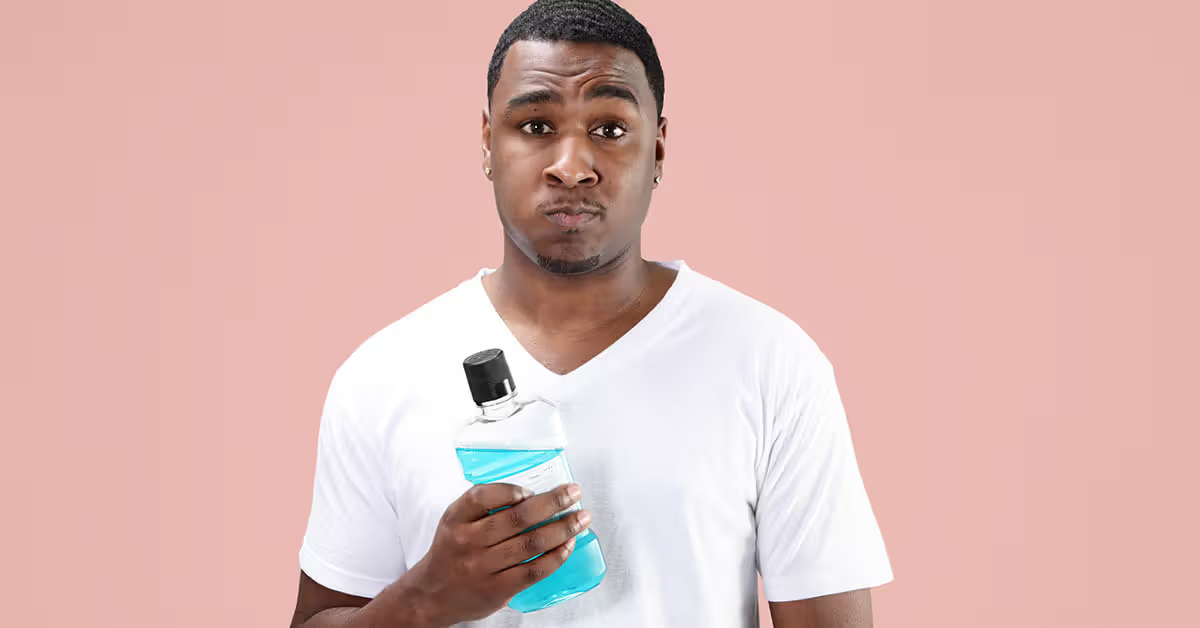Mouthwash is one of the simplest tools for oral hygiene. A quick swish promises fresh breath, cleaner gums, and protection against bacteria. Yet for many, that refreshing rinse is overshadowed by a sharp, burning sensation. It can feel like fire on the gums, tongue, or cheeks, making people question if something is wrong. So, why does mouthwash burn? Is it a sign of effectiveness or an indicator of irritation? Let’s dive deep into the science, myths, and practical solutions around this common oral health question.
What Ingredients in Mouthwash Cause the Burning Sensation?
The burn from mouthwash often comes down to its ingredients. Many commercial formulas are packed with antimicrobial and cooling agents, which can sting the delicate lining of your mouth.
1. Alcohol (Ethanol)
- Most traditional mouthwashes contain ethanol.
- Ethanol kills bacteria by breaking down their protective membranes.
- However, it also dries out oral tissues, leaving them more prone to irritation.
- The higher the alcohol percentage, the more intense the burning.
2. Essential Oils (Menthol, Thymol, Eucalyptol)
- These oils give mouthwash its “cool” taste.
- They act as natural antiseptics but can overwhelm sensitive tissues.
- Menthol in particular activates nerve endings that create a cold-burning sensation.
3. Antibacterial Agents (Chlorhexidine, Cetylpyridinium Chloride)
- These are highly effective at killing germs.
- Dentists often prescribe chlorhexidine-based rinses for gum disease.
- Unfortunately, they may cause a bitter taste and irritation if used long-term.
4. Hydrogen Peroxide
- Common in whitening mouthwashes.
- Works by releasing oxygen bubbles to lift stains.
- Prolonged contact can irritate gums and cause temporary burning.
Here’s a quick comparison:
| Ingredient | Purpose | Possible Side Effect | Burn Intensity |
| Alcohol (Ethanol) | Kills bacteria, preserves liquid | Dryness, stinging | High |
| Menthol, Thymol, Eucalyptol | Freshens breath, antiseptic | Tingling, burning | Medium |
| Chlorhexidine, CPC | Strong antibacterial | Irritation, taste alteration | Medium-High |
| Hydrogen Peroxide | Whitening, antibacterial | Gum irritation, sensitivity | Medium |
Why Does Mouthwash Burn Some People More Than Others?
Not everyone experiences the same level of discomfort. The reason mouthwash burns more for some lies in individual oral health and sensitivity.
- Sensitive gums or oral tissues: If you have small cuts, canker sores, or inflamed gums, the sting will be sharper.
- Dry mouth (xerostomia): Saliva helps buffer irritation. Less saliva means more burn.
- Braces, dental work, or oral wounds: Exposed tissues are more vulnerable.
- Frequency of use: Using strong rinses multiple times a day compounds the irritation.
Case example:
Anna, a 32-year-old with braces, described feeling like “her gums were on fire” every time she used alcohol-based rinses. Her dentist recommended an alcohol-free fluoride rinse, which stopped the burning while still protecting her teeth.
Is the Burning from Mouthwash Normal or a Warning Sign?
A mild, short-lived burn is normal for many users. It simply means the antiseptic agents are working against bacteria. However, intense or lasting pain is a red flag.
- Normal burning: Quick sting that fades after rinsing.
- Warning signs: Persistent pain, peeling tissue, bleeding gums, or swelling.
According to the American Dental Association (ADA), alcohol-based mouthwashes are safe for most people, but they are not necessary for everyone. If burning is severe, switching to gentler formulas is recommended.
Health Benefits vs. Drawbacks of Burning Mouthwash
Like many health products, mouthwash has trade-offs. The key is knowing when the burn is worth it.
Benefits:
- Kills harmful bacteria
- Reduces plaque buildup
- Freshens breath instantly
- Provides fluoride protection in some formulations
Drawbacks:
- Irritation of soft tissues
- Possible alteration of oral microbiome
- Dry mouth with overuse
- Enamel sensitivity with whitening agents
Here’s a side-by-side comparison:
| Type of Mouthwash | Benefits | Drawbacks |
| Alcohol-Based | Strong antibacterial, fresh breath | Burns, dries mouth, irritates |
| Alcohol-Free | Gentle, safe for kids & sensitive mouths | Slightly less antibacterial |
| Whitening (Peroxide) | Removes surface stains, brightens teeth | Sensitivity, gum irritation |
| Prescription (Chlorhexidine) | Fights gum disease effectively | Alters taste, stains teeth |
How to Reduce or Prevent the Burning Sensation
If the burn makes you avoid mouthwash, there are practical solutions.
- Switch to alcohol-free formulas: Look for labels that say alcohol-free or gentle.
- Dilute strong mouthwash with water: Dentists sometimes suggest mixing half-and-half for sensitive patients.
- Use herbal rinses: Aloe vera, chamomile, and green tea mouthwashes soothe instead of sting.
- Don’t use right after brushing: Brushing temporarily softens enamel, making irritation worse.
- Limit use to once or twice daily: More isn’t always better.
Myths and Misconceptions About Mouthwash Burning
Many people believe myths about why mouthwash burns. Let’s set the record straight.
- Myth 1: The stronger the burn, the better it works.
- Fact: Effectiveness doesn’t depend on burning; alcohol-free rinses can be equally effective.
- Myth 2: All mouthwashes must burn to kill bacteria.
- Fact: Gentle rinses with fluoride or essential oils can work without discomfort.
- Myth 3: Burning means the mouthwash is killing more germs.
- Fact: The burn is usually from alcohol irritating tissues, not extra bacteria being killed.
When to See a Dentist About Mouthwash Burning
Sometimes the burn is a symptom of a bigger issue. Seek professional advice if:
- Burning is severe or constant.
- You notice swelling, sores, or peeling inside your mouth.
- You experience allergic reactions like rashes or difficulty breathing.
- Burning lasts longer than a week of regular use.
Dentists may suggest switching to prescription rinses or evaluating for gum disease, allergies, or oral infections.
Best Mouthwash Options That Don’t Burn
If you want freshness without fire, these options can help:
- Alcohol-Free Fluoride Mouthwash – Strengthens enamel while staying gentle.
- Herbal Mouthwashes – Aloe vera, tea tree oil, or chamomile-based rinses soothe irritation.
- Pediatric-Friendly Rinses – Mild and safe for sensitive users.
Comparison of Gentle Alternatives:
| Brand/Type | Key Feature | Best For |
| ACT Anticavity | Fluoride, alcohol-free | Daily enamel protection |
| Biotene Dry Mouth Rinse | Gentle hydration for dry mouth | People with xerostomia |
| Tom’s of Maine Natural | Herbal ingredients, no burning | Natural product lovers |
| Listerine Zero | Alcohol-free, mild antiseptic | Sensitive mouths |
Final Thoughts – Why Does Mouthwash Burn and What Should You Do?
So, why does mouthwash burn? In most cases, the answer lies in alcohol and other strong antibacterial ingredients irritating delicate oral tissues. A little sting can be normal, but ongoing pain isn’t something to ignore. The good news? You don’t need to suffer for fresh breath. With alcohol-free and herbal options widely available, you can protect your teeth, fight bacteria, and enjoy a clean mouth without the discomfort.
Remember: A healthy mouth doesn’t need to hurt to stay clean.

